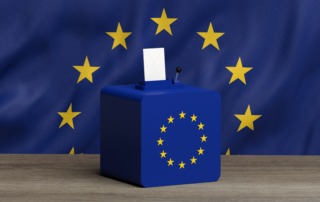The Threat of AI-Generated Disinformation to European Elections and Democracy
In view of the elections that will be held in 2024 in the EU and other parts of the world including the US and UK, there are various challenges to democratic processes as technological advancements are on the rise. It is argued that electoral periods and times of political crisis serve as fertile ground for the production and dissemination of AI-generated content, heightening concerns about the impact on public perception and democratic processes. Recent instances have demonstrated the alarming potential of AI to enable the production of deceptive narratives, with such disinformation finding [...]
AI Hallucination: When AI Makes Things Up
The word “hallucinate” was announced as the word of the year by the Cambridge Dictionary in 2023. It means “to seem to see, hear, feel, or smell something that does not exist, usually because of a health condition or because you have taken a drug”. The term "hallucination" originates from the Latin word "alucinari," meaning to wander in the mind. Yet, the Cambridge Dictionary added another definition for the word that signifies the emergence of a new phenomenon: “When an artificial intelligence hallucinates, it produces false information”. This indicates that AI may have [...]
“Using Media Literacy to Fight Digital Fake News in Later Life: A Mission Impossible?”
Media Literacy Training for Seniors to Fight Fake News The European Commission defines disinformation as “false or misleading content that is spread with an intention to deceive or secure economic or political gain,” whereas misinformation refers to the same kind of content shared without harmful intention, regardless of its consequences. Disinformation is commonly referred to as ‘fake news,’ and it seriously threatens the credibility of information sources and causes public harm on many layers. Media literacy training functions as a strong instrument used to combat the spread of false information by empowering citizens [...]
Fake news and critical literacy in the digital age: sharing responsibility and addressing challenges
How can we tackle the ongoing challenge of so-called ‘fake news’? Gianfranco Polizzi, PhD Researcher in the Department of Media at Communications at LSE, argues that we all have a responsibility to learn critical literacy to help us better to evaluate information, both on- and offline, and here sets out the responsibilities held by the different actors involved. This post was first published on the London School of Economics' Media Policy Project Blog on May 21, 2018. Social inclusion and democratic participation rely on opportunities to access, express and share information as citizens. The extent to [...]
European Commission: Fake News and Online Disinformation
The European Commission has published its High Level Expert Group (HLEG) Report to advise the EC on fake news and disinformation online.
EAVI Roundtable Debate at the European Parliament – Democracy, Journalism and Literacy
In December EAVI together with the Centre for Media Pluralism and Media Freedom held the Democracy, Journalism and Literacy event at the European Parliament. The event was hosted by MEPs Barbara Spinelli and Curzio Maltese. The event focused on the dangers posed to media pluralism presented by new media and the threat to democracy this creates, as well as the role of media literacy and other initiatives to combat this. Barbara Spinelli opened the discussions by sharing her observations of media freedom – namely the level of self-censorship among journalists, protections afforded to whistleblowers, and [...]
Conspiracies and Hoaxes in the Wake of the Las Vegas Massacre
Last week, 59 people were killed and a further 489 were injured when Stephen Paddock opened fire on a crowd of men, women and children in Las Vegas with no apparent motive. Since then conspiracy theories and hoaxes have spread across the Internet.
Seminar: Protecting European Democracy in a Post-Truth Society, European Parliament
On 6th of September Marietje Schaake and Morten Løkkegaard from Alliance of Liberals and Democrats for Europe hosted a seminar “Protecting democracy in a post-truth era.”
Inter Alia #1: EAVI’s Media Literacy Digest
EAVI attempts to keep you updated with all the new initiatives, software, books, projects, changes in policy, news and whatever else we find relating to media literacy in Europe.




























































































































































